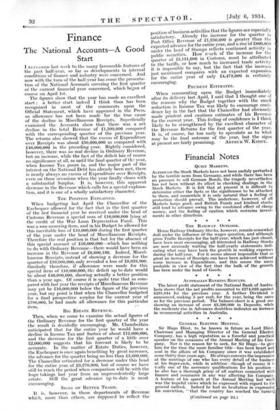Finance
The National Accounts—A Good
Start
I REFERRED last N1cek to the many favourable features of the past half-year, so far as developments in internal conditions of finance and industry were concerned. And now with the turn of the half-year has come the presenta- tion of the National Accounts covering the first quarter of the current financial year concerned, which began of course on April 1st. The figures show that the year has made an excellent start ; a better start indeed I think than has been recognized in most of the comments upon the Official Statement, which have appeared in the Press, as allowance has not been made for the true cause of the decline in Miscellaneous Receipts. Superficially examined the • Accounts show that there was a net decline in the total Revenue of £1,399,000 compared with the corresponding quarter of the previous year. The returns also showed that the excess of Expenditure over Receipts was about £50,000,000 as compared with £46,000,000 in the preceding year. Rightly considered, however, there was no real decline in Ordinary Revenue, but an increase, while the fact of the deficit has of course no significance at all, as until the final quarter of the year, when Income Tax pours in, and the major part of the interest on the National Debt has already been met, there is nearly always an excess of Expenditure over Receipts, even on those occasions when the year finally closes with a substantial Surplus. It is, however, this apparent decrease in the Revenue which calls for a special explana- tion, and it is one of a wholly satisfactory character. • THE POSITION EXPLAINED.
When budgeting last April the Chancellor of the Exchequer allowed for the fact that in the first quarter of the last financial year he received under the head of Customs Revenue a special sum of £10,000,000 lying at the credit of the War Loan Depreciation Fund. This was a non-recurring item, and in his Budget he allowed for this inevitable loss of £10,000,000 during the first quarter of the year under the head of Miscellaneous Receipts. Therefore the real position is that but for the absence of this special amount of £10,000,000—which has nothing to do with Ordinary Revenue—there would have been an increase in the Revenue of £8,600,130. Indeed, Miscel- laneous Receipts, instead of showing a decrease for the quarter of £10,000,000, only revealed a loss of £8,028,900. Similarly therefore, if allowance were made for this special item of £10,000,000, the deficit up to date would be about £40,000,000, showing actually a better position than a year ago. Of course it is quite true that as com- pared with last year the receipts of Miscellaneous Revenue may yet be £10,000,000 below the figure of the previous year, but my point is that when the Chancellor budgeted for a final prospective surplus for the current year of £796,000, he had made all allowance for this particular item. - BIG ESTATE REVENUE.
Then, when we come to examine the actual figures of the Ordinary Revenue for the first quarter of the year the result is decidedly encouraging. Mr. Chamberlain anticipated that for the entire year he would have a decline in Income Tax and Surtax of about £12,000,000, and the decrease for the first quarter of a little over 12,000,000 suggests that his forecast is likely to be accurate. In the matter of Estate Duties, however, the Exchequer is once again benefiting by great increases, the advance for the quarter being no less than £5,660,000. The Chancellor estimated for a decrease under this head for the entire year of19,270,000, but of course we have still to reach the period when comparison will be with the huge takings last year from an unprecedentedly large estate. Still the great advance up to date is most encouraging. - SIGNS OF BETTER- TRADE. • - It is, -however;- in those departments of Revenue which, more than others, are Supposed to--reflect -the position of business activities that the-figures are especially satisfactory. Already the increase for the quarter in Post Office Revenue of £1,250,000 is greater than the expected advance for the entire year, and a rise 4-18005000 under the head of Stamps reflects continued activity in public securities. How iruch of the increase for the quarter of £3,121,000 in Customs, must be attributed to the tariffs, - or how .much to increased trade activity it is impossible to say, but the fact that the increase just mentioned compares with an expected expansion for the entire year of only £4,473,000 is certainly encouraging.
PRUDENT ESTIMATES.
When commenting upon the Budget immediately after its delivery last-April, I said that I thought one of the reasons why the Budget together with the small reduction in Income Tax was likely to encourage confi- dence lay in the fact that the Chancellor had obviously made priident and cautious estimates of his Revenue for the current year. This feeling of confidence is I think likely to be strengthened by the excellent character of the Revenue Returns- for the first quarter of the year. It is, of course, far too early to speculate as to what may be the final outcome of the year, but the signs at present are fairly promising. • ARTHUR W. KIDDY.










































 Previous page
Previous page